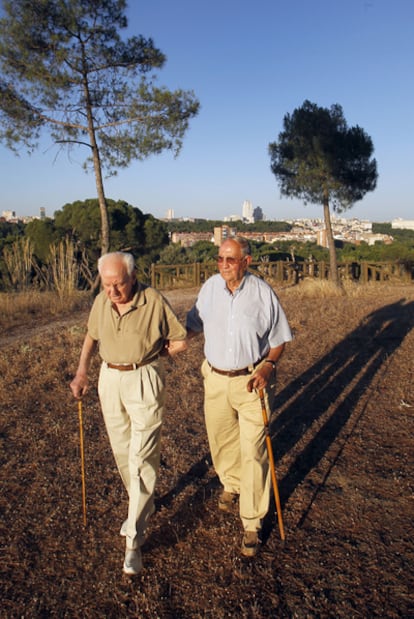Three years that changed Spain
A war that would pit brother against brother, eventually dividing a country and leaving painful scars decades later, broke out one lazy, hot weekend in July of 1936
On Saturday, the bodies of 16 men who were shot to death by Falangists in Toledo in April of 1939 were returned to their families. The men, crushed by the loss of the war to the Franco regime and returning in defeat to their homes in Menasalbas, were surprised by neighbors from their own village who had become Falangists in their absence. Lined up against the wall of the local cemetery, they were all shot to death. The oldest among them was 60, and the youngest just 14.
The final return of their remains to their families at the weekend was a fitting and timely gesture. on Monday, Spain will commemorate the 75th anniversary of the war's outbreak over the weekend of July 17-19, 1936.
Though many memories of that weekend are foggy, due in large part to the gradual and uneven spread of the uprising against the Republican government, and to conflicting radio reports between the government and the Nationalists, most are certain of one thing: It was hot - very, very hot. Cordobans would later tell their grandchildren they knew a war was coming because in the days leading up to that weekend, the night skies were full of shooting stars. Emilio Caballero was working in a field in Albacete when friends came to warn him that the Civil Guard were taking people away. The next thing he knew he was on the back of a truck with a rifle in his hands, and shortly after, defending a machine gun hole in Teruel that he had no idea how to operate. Only two people lived to tell of the experience. Caballero also managed to survive years of combat on the frontline, only to be captured and sent to a concentration camp in Gusen after escaping to France. There, only one in nine prisoners survived. Today, he is 94 years old.
Normality reigned in some parts of Spain that weekend, while others reverberated with the sounds of shots and the cries of victims. José Luis Rodríguez Viñals was 16 years old and spending the summer on a ranch in southern Badajoz. He remembers that the lights went out one morning and his mother turned on the radio, an Emerson, and the waves were full of news that deeply worried his parents. Several days later, armed men arrived to take his father away. Two years later, he joined the Nationalist army.
Alfredo Salas was a year older that summer, and living on Eloy Gonzalo street in Madrid. He remembers hearing shots, taking a walk with his girlfriend and seeing bodies in the street. He remembers terror. Though he had never flown, Salas became a pilot for the Republican army. On the last day of the war, Rodríguez and Salas would coincide in Madrid.
75 years later, they agreed to have their photo taken together for El PAÍS. As they approach each other this day, Rodríguez is the first to speak. "Give me a hug, brother," he says, and they embrace. Salas asks for his arm for support in walking. Arm in arm, canes in hand, they walk on, heads bent in muted discussion of the three years that changed Spain.

Tu suscripción se está usando en otro dispositivo
¿Quieres añadir otro usuario a tu suscripción?
Si continúas leyendo en este dispositivo, no se podrá leer en el otro.
FlechaTu suscripción se está usando en otro dispositivo y solo puedes acceder a EL PAÍS desde un dispositivo a la vez.
Si quieres compartir tu cuenta, cambia tu suscripción a la modalidad Premium, así podrás añadir otro usuario. Cada uno accederá con su propia cuenta de email, lo que os permitirá personalizar vuestra experiencia en EL PAÍS.
¿Tienes una suscripción de empresa? Accede aquí para contratar más cuentas.
En el caso de no saber quién está usando tu cuenta, te recomendamos cambiar tu contraseña aquí.
Si decides continuar compartiendo tu cuenta, este mensaje se mostrará en tu dispositivo y en el de la otra persona que está usando tu cuenta de forma indefinida, afectando a tu experiencia de lectura. Puedes consultar aquí los términos y condiciones de la suscripción digital.








































